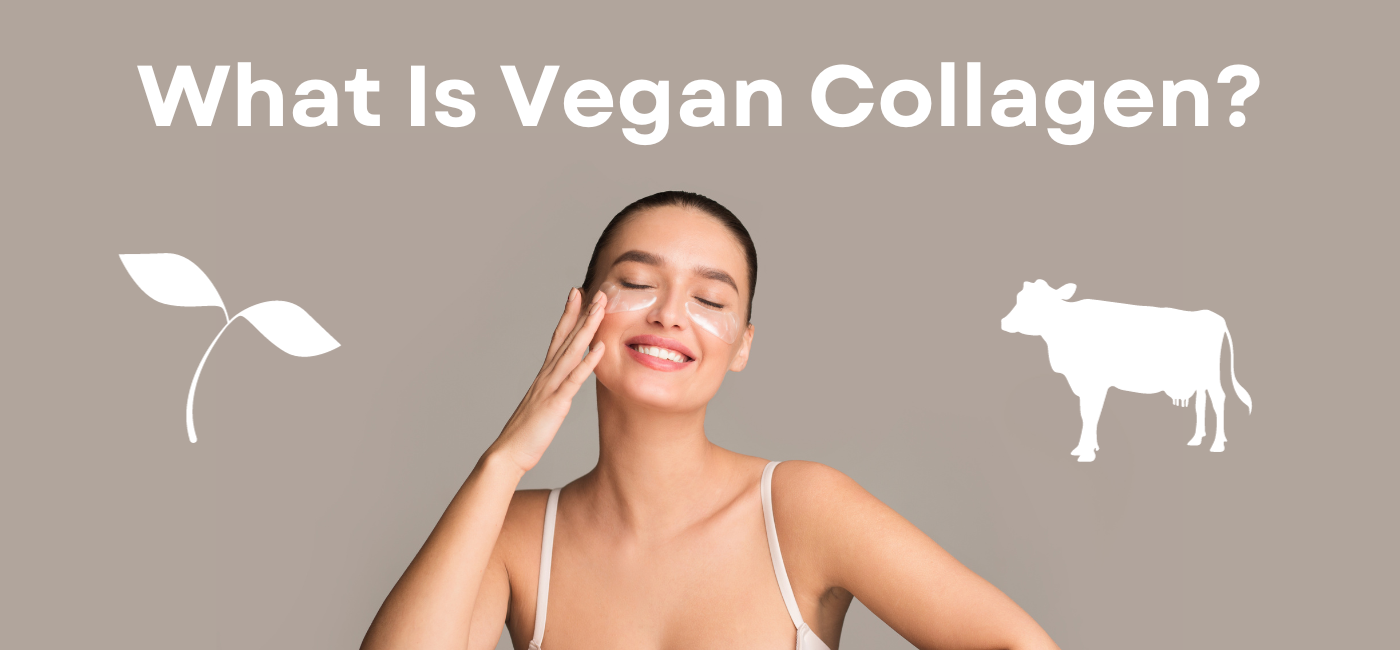

Embarking on a journey into the world of skincare and wellness, we’re delving into the concept of vegan collagen — a new approach to nurturing your skin and body that leverages scientific research and thousands of years of traditional medical knowledge.
Unlike traditional collagen sourced from animal products, vegan collagen represents a compassionate and sustainable alternative. Join us as we unravel the secrets behind this plant-based elixir, exploring its benefits, sources, and the transformative impact it can have on your health and beauty regimen.
Get ready to discover a new era in collagen care that aligns with both your well-being and ethical values.
Let’s start with the basics…

All of our bodies contain collagen naturally. In fact, collagen is the most abundant protein in the body. So – it’s important!
Collagen is sometimes called the glue that holds your body together. Collagen is primarily made up of three amino acids: glycine, proline and hydroxyproline.
Collagen is responsible for providing structure to the skin, hair, nails, and various connective tissues. It is part of what makes tissues strong and able to withstand stretching.
A number of factors can decrease collagen production in our body. Both age and environmental factors can negatively impact your collagen production.
For example:
The collagen in your skin can go from being a tightly organized network of fibers to something more disorganized. And these other environmental factors can damage collagen fibers, leading to wrinkles on the skin.
This decrease in collagen production in our bodies can have a negative impact on our skin, joins, hair, etc. Doing what you can to increase collagen production, especially as you age can help you stay healthier.
So, supplementing with animal-based or plant-based collagen can help your body produce more collagen and slow down the aging process.
Vegan collagen refers to a plant-based alternative to traditional collagen supplements, which is typically derived from animal sources such as bones, skin, and connective tissues.
In the context of vegan collagen, plant-based ingredients are used to replicate the structure and/or function of collagen.
Common sources for plant-based collagen alternatives include algae, fruits, vegetables, seeds, and plant based protein sources.
These sources are rich in nutrients and amino acids that can support the body's natural collagen production and also directly improve skin, hair, nail and joint health in other ways.
Vegan collagen products aim to offer individuals an ethical and cruelty-free option for promoting skin health and overall well-being without relying on animal-derived ingredients. It's important to note that while these products may provide certain nutrients that support collagen production, they don’t collagen but rather ingredients that support the body's collagen synthesis.
Vegan collagen products do not contain actual collagen but rather include plant-based ingredients that are believed to support the body's natural collagen production. Some common sources of nutrients found in vegan collagen supplements include:
Amino Acids:
Vitamins:
While the term "vegan collagen" is a bit of a misnomer, as it doesn't contain actual collagen but rather ingredients that support collagen production, certain components found in vegan collagen supplements may offer health benefits.

Here are some potential health benefits associated with the key components of vegan collagen supplements:
As always, keep in mind that the research on these benefits is still evolving, and individual responses can vary.
Incorporating vegan collagen into your daily routine is simple and diverse.
One popular method is through supplements, available in various forms like capsules, powders, or gummies, providing a convenient way to enhance collagen intake.
Additionally, adopting a diet rich in collagen-boosting nutrients is key. Include foods like berries, citrus fruits, leafy greens, nuts, and seeds, which are abundant in vitamins C and E, as well as amino acids.
Plant-based collagen-boosting beverages, such as fortified plant milks or collagen-infused smoothies, offer tasty alternatives.
The versatility of vegan collagen allows individuals to choose a method that best fits their preferences and lifestyle, ensuring a cruelty-free approach to supporting skin health and collagen production.
Vegan collagen alternatives differ from animal-based collagen as they do not contain actual collagen but instead incorporate plant-based ingredients intended to support the body's natural collagen production.
Animal-based collagen:
Vegan collagen:
Nutritionally, both vegan and animal-based collagens share the common goal of promoting skin elasticity, joint health, and overall wellness.
While some argue that animal-based collagen may have a closer structural resemblance to human collagen, vegan collagen supplements aim to stimulate the body's natural collagen production by providing essential building blocks like amino acids and promoting a holistic approach to skincare.
The choice between vegan and animal-based collagen ultimately depends on individual preferences, values, and dietary restrictions, and even how they work for your body.
Q: What is vegan collagen?
Q: How is vegan collagen produced?
Q: Can vegan collagen supplements provide the same benefits as animal-derived collagen?
Q: Are there specific foods that can help boost vegan collagen production?
Q: Are vegan collagen supplements suitable for everyone?
Q: Can vegan collagen improve skin health?
Q: Can a vegan diet alone provide sufficient collagen for the body?
Q: Are there any potential side effects of vegan collagen supplements?
In conclusion, vegan collagen represents an innovative approach to supporting skin health and overall wellness without relying on animal-derived sources.
While vegan collagen alternatives may not precisely replicate the structure of animal-derived collagen, they offer plant-based solutions rich in essential nutrients that contribute to collagen synthesis.
Plant-based foods, supplements, and skincare products, incorporating ingredients like Tremella mushroom, tocos, and vitamin-rich plant sources, provide cruelty-free options for those seeking ethical and sustainable choices.
As research in this field progresses, vegan collagen products continue to evolve, offering a promising avenue for individuals embracing plant-based lifestyles to enhance their skin health in a compassionate and environmentally friendly manner.
--
Disclaimer: We are not doctors and we don’t pretend to be. Always consult a healthcare professional before starting any new supplement regimen, especially for individuals with pre-existing conditions, or while pregnant or nursing.